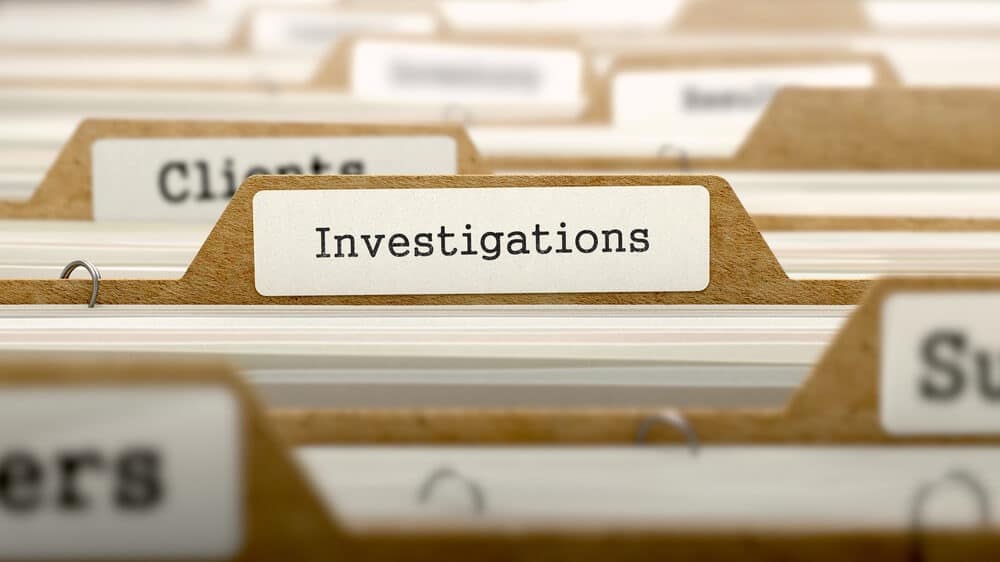
 Investigation is the initial step in the federal criminal justice system. In this phase, federal agents investigate possible violations of federal law. Their objectives are to determine: (1) whether a federal crime has been committed; (2) the responsible parties; and (3) the evidence, if any, pertaining to the crime.
Investigation is the initial step in the federal criminal justice system. In this phase, federal agents investigate possible violations of federal law. Their objectives are to determine: (1) whether a federal crime has been committed; (2) the responsible parties; and (3) the evidence, if any, pertaining to the crime.
How is a federal investigation initiated?
In most instances, a federal investigation is initiated by a credible crime report. Occasionally, it may also be initiated by information law enforcement agents receive from defendants in pending criminal cases who are seeking leniency (i.e., cooperators). In other instances, a federal investigation may be prompted by information collected by a federal intelligence agency, such as the CIA, or by a parallel civil investigation conducted by a regulatory agency, such as the SEC or the FDA.
Who takes part in a federal investigation?
Agents of the law, such as FBI special agents, are the key players in a federal investigation. During a federal investigation, agents perform the majority of the work, including gathering evidence and interviewing witnesses. However, they are not independent.
Agents assigned to a federal investigation work closely with a federal prosecutor. The prosecutor provides legal counsel to the agents and assists them in obtaining legal documents such as subpoenas and search warrants. In addition, the prosecutor will decide whether formal criminal charges will be filed at the conclusion of the investigation. Therefore, the prosecutor’s assessment of the case’s merits is crucial to the agents working the case.
It is not uncommon for multiple federal agencies, or even federal and state agencies, to cooperate in a joint investigation for certain types of federal investigations, such as those involving violent transnational gangs or large-scale white collar crimes. In these instances, one or more agents may assume the role of “lead” or “case” agent in charge of the investigation.
What occurs throughout a federal investigation?
Agents of federal law enforcement have access to a vast array of investigative techniques.
In a federal investigation, agents and prosecutors seek to secure an indictment and conviction. Agents of federal law enforcement are well-trained to perform this duty. To gain a psychological advantage, agents may arrive unannounced at a suspect’s residence early in the morning to question and interrogate the individual, when the individual is not fully alert or prepared. As another illustration, law enforcement agents may employ deception as an investigative technique.
The agents may inform the suspect that the investigation is not focused on him and that they are merely seeking information about another person. The suspect may then be persuaded to provide incriminating statements. Because federal law enforcement agents have more resources, training, and expertise than the average defendant, it is crucial that anyone who is the subject of a federal investigation immediately seek the counsel of an experienced attorney familiar with the federal investigative procedure.
How can you tell if you are the subject of a federal investigation?
A federal investigation can be time-consuming. In some instances, agents may spend years investigating a case before bringing federal criminal charges. In addition, federal investigations are typically conducted in secret; related documents and reports may be classified, and agents may be instructed not to discuss the investigation in public. During this time, the subject of the investigation may be unaware that he is the subject of an investigation until agents knock on his door to make an arrest.
Individuals typically learn that they are the subject of a federal investigation when one of the following occurs:
- A federal prosecutor notifies you formally through a target letter that you are the subject of an investigation.
- A federal agent of law enforcement calls you and requests a meeting.
- Unannounced federal agents attempt to question you at your residence, place of business, or other frequented location.
- Agents of the federal government execute a search warrant at your residence or place of business.
- You receive a subpoena from a grand jury requiring you to testify or produce evidence.
- Former coworkers or business partners inform you that they have been questioned, searched, or subpoenaed to testify in relation to activities in which you participated.
These events may occur simultaneously. For instance, a person may discover that he is under investigation when federal agents execute a search warrant at his residence one morning.
During this search, agents attempt to question the suspect about the crime. The individual receives a target letter from the local United States Attorney’s Office following the search. In addition, later in the day, the individual receives calls from coworkers informing him that the FBI has contacted them. Obviously, discovering that one has been under investigation for years can be nerve-wracking.
What steps should I take if I am being investigated?
What if federal agents desire a conversation with me? An old adage states that you should never discuss a crime with the police because anything you say can be used against you. Because anything you say or write can be used against you, the more accurate piece of advice is to avoid discussing a crime with anyone.
If you are implicated in a federal investigation, particularly if you are a target of the investigation, you should follow two rules: (1) obtain legal representation immediately; and (2) do not speak or write to anyone else about the investigation without first consulting a lawyer with experience handling federal criminal investigations.
It should be obvious why you need an attorney and why you should not speak with law enforcement. To some, it may be less obvious why you should not discuss the investigation with third parties without consulting an attorney.
How can a lawyer assist with a federal investigation?
Once you have obtained legal representation, your attorney, who should be knowledgeable about federal criminal law and federal investigations, can assist you in answering important questions and putting you in the best possible position..
Consult with an attorney with experience in federal criminal investigation. We frequently represent individuals involved in federal criminal investigations at Ryan Garry. These individuals may be investigated as targets, subjects, or witnesses. In many instances, we were able to resolve these challenging situations quickly and discretely without filing federal charges. When criminal charges are inevitable, we ensure that our clients are in the strongest position possible to defend themselves. Please contact us if you believe you may be implicated in a federal criminal investigation and wish to discuss your case with an attorney.
